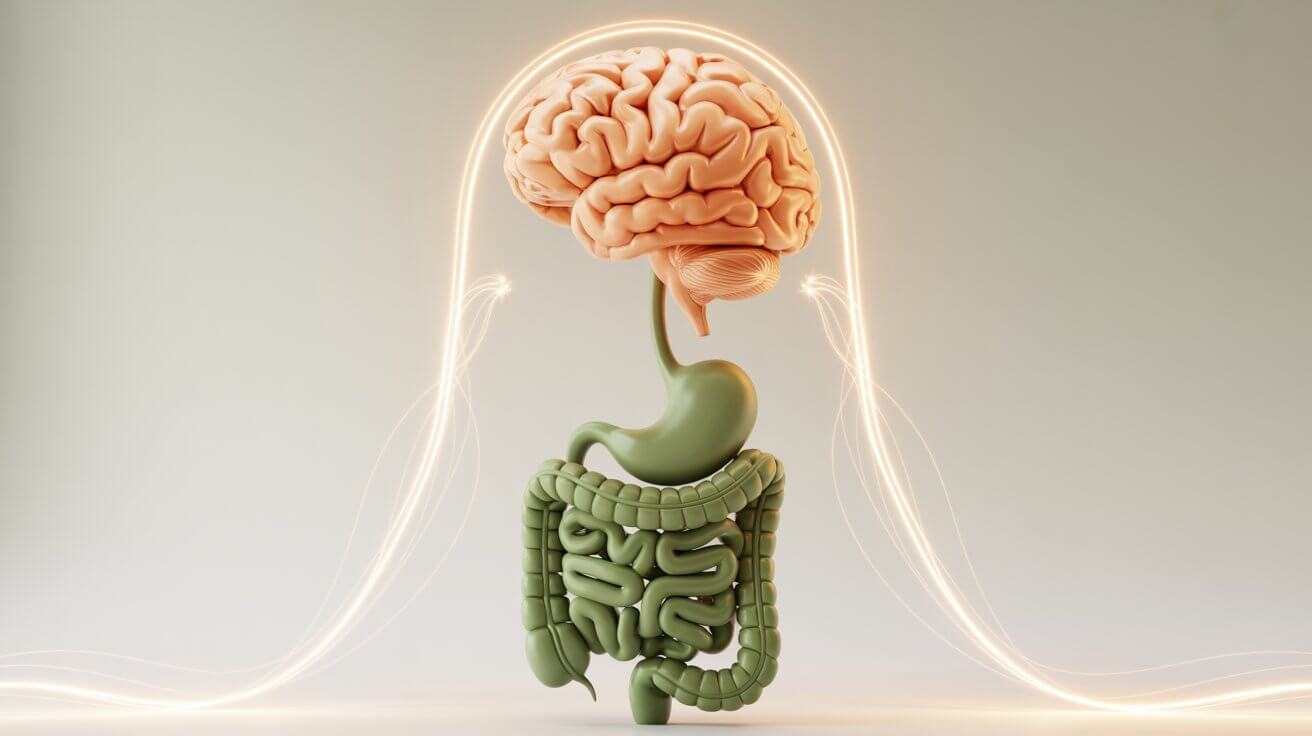Have you ever felt “butterflies” in your stomach before a big presentation? Or noticed your digestion feels “off” during a particularly stressful week? That sensation isn’t just in your head. It’s a powerful, real-time conversation happening between your two “brains”: the one in your skull and the one hidden deep in your gut. This constant communication is the foundation of the gut-brain connection, a critical pathway that explains why your digestive health is profoundly linked to your mood, mental clarity, and overall sense of well-being.
What Is the Gut-Brain Connection?
Imagine your gut is a bustling city, home to trillions of microorganisms, collectively called the gut microbiome. This community includes bacteria, viruses, and fungi that do more than just help digest food. They produce vitamins, regulate your immune system, and manufacture hundreds of neurochemicals—the very same chemicals your brain uses to regulate emotions. For instance, it’s estimated that up to 95% of the body’s serotonin, a key mood stabilizer, is produced in the gut.
This communication flows both ways along a superhighway called the vagus nerve. Stress signals from the brain can trigger digestive upset, while an imbalanced or inflamed gut can send signals to the brain that may contribute to feelings of anxiety, brain fog, or even depression. When the gut microbiome is out of balance—a state called dysbiosis—it can lead to a breakdown in this vital conversation.
4 Subtle Signs of an Unhealthy Gut
An unhealthy gut doesn’t always scream for attention with obvious symptoms like bloating or pain. Sometimes, the signs are more subtle and show up in your mental state. Understanding these symptoms through the lens of the gut-brain connection is the first step toward taking action.
Persistent Brain Fog
Difficulty concentrating, feeling mentally sluggish, or struggling with memory can be linked to inflammation originating in the gut.
Mood Swings and Gut Health and Anxiety
An imbalanced microbiome can affect the production of neurotransmitters like serotonin and dopamine, leading to increased anxiety or unexplainable shifts in mood.
Chronic Fatigue
If your body is constantly fighting low-grade inflammation from the gut, it can drain your energy reserves, leaving you feeling tired no matter how much you sleep.
New Food Sensitivities
Suddenly reacting to foods you once enjoyed can be a sign that your gut lining has become compromised, a condition often referred to as “leaky gut.”
How to Improve Gut Health: 4 Practical Steps
Restoring this connection doesn’t require a complete life overhaul. It’s about making small, consistent choices that support a healthy gut environment. Think of it as tending to a garden; with the right care, it will flourish.
Feed Your Gut Microbiome with Fiber
Your gut microbes thrive on prebiotic fiber found in plant-based foods. Aim to include a variety of fruits, vegetables, legumes, and whole grains in your diet. Think asparagus, bananas, onions, garlic, and oats. A diverse diet leads to a diverse—and more resilient—gut microbiome.
Add Probiotic-Rich Foods
Probiotics are live beneficial bacteria that help restore balance to your gut. Fermented foods are excellent sources. Consider adding yogurt (with live cultures), kefir, sauerkraut, kimchi, or kombucha to your routine.
Prioritize Stress Management
Since stress directly impacts gut health, finding ways to manage it is crucial. Practices like mindfulness, meditation, deep breathing exercises, or even a quiet walk in nature can calm the nervous system and, in turn, your gut.
Focus on Quality Sleep
Sleep is when your body, including your gut, repairs itself. A lack of quality sleep can disrupt your microbiome. Aim for 7-9 hours of consistent, restorative sleep per night to give your gut-brain axis the downtime it needs.
- Want to keep your heart strong and healthy? Explore our eBook Hypertension Made Simple – Everything You Need to Know for a Healthier Blood Pressure and discover practical steps to support lifelong wellness.
A Kinder Approach to Your Health
Understanding the gut-brain connection is empowering. It shifts the focus from treating isolated symptoms to nurturing a complex, interconnected system. The next time you feel mentally drained or emotionally off-balance, consider looking at your digestive health. By taking small, deliberate steps to care for your gut, you are also caring for your brain, paving the way for improved mood, sharper focus, and a greater sense of vitality.
Source & Further Reading
For those interested in the scientific underpinnings of the gut-brain axis, this comprehensive review provides an in-depth look at the communication between the gut microbiota and the central nervous system.
- Martin, C. R., Osadchiy, V., Kalani, A., & Mayer, E. A. (2018). The Brain-Gut-Microbiome Axis. Cellular and molecular gastroenterology and hepatology, 6(2), 133–148.
https://www.ncbi.nlm.nih.gov/pmc/articles/PMC6047317/










